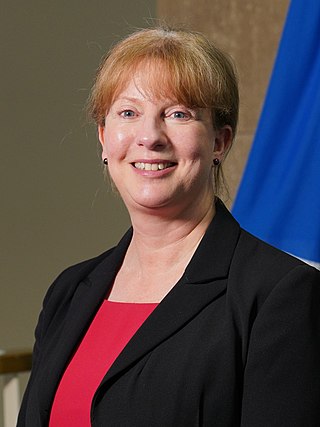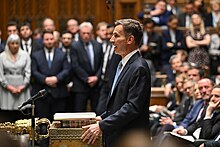A spending review, or occasionally a comprehensive spending review, is a governmental process in the United Kingdom carried out by HM Treasury to set firm expenditure limits and, through public service agreements, define the key improvements that the public can expect from these resources.

Shona McRory Robison is a Scottish politician who has served as Cabinet Secretary for Finance and Local Government since 2023. A member of the Scottish National Party (SNP), she previously served as Deputy First Minister of Scotland from 2023 to 2024. Robison has been the Member of the Scottish Parliament (MSP) for Dundee City East since 2003 and was an additional member for the North East Scotland region from 1999 to 2003.

The June 2010 United Kingdom Budget, officially also known as Responsibility, freedom, fairness: a five-year plan to re-build the economy, was delivered by George Osborne, Chancellor of the Exchequer, to the House of Commons in his budget speech that commenced at 12.33pm on Tuesday, 22 June 2010. It was the first budget of the Conservative-Liberal Democrat coalition formed after the general election of May 2010. The government dubbed it an "emergency budget", and stated that its purpose was to reduce the national debt accumulated under the Labour government.

The 2011 United Kingdom budget, officially called 2011 Budget – A strong and stable economy, growth and fairness, was delivered by George Osborne, the Chancellor of the Exchequer, to the House of Commons on 23 March 2011.

The United Kingdom government austerity programme is a fiscal policy that was adopted for a period in the early 21st century following the Great Recession. The term was used by the Coalition and Conservative governments in office from 2010 to 2019, and again during the 2021–present cost of living crisis. The two periods are separated by a stint of interventionist, Keynesian spending during the COVID-19 pandemic. The first period alone was “one of the biggest deficit reduction programmes seen in any advanced economy since World War II”, with the emphasis on shrinking the state rather than fiscal consolidation as was more common elsewhere in Europe.

The 2012 United Kingdom budget was delivered by George Osborne, the Chancellor of the Exchequer, to the House of Commons on Wednesday 21 March 2012.

The 2013 United Kingdom budget was delivered by George Osborne, the Chancellor of the Exchequer, to the House of Commons on Wednesday 20 March 2013.

The 2016 United Kingdom budget was delivered by George Osborne, the Chancellor of the Exchequer, to the House of Commons on Wednesday, 16 March 2016.

The November 2017 United Kingdom budget was delivered by Philip Hammond, the Chancellor of the Exchequer, to the House of Commons on Wednesday, 22 November 2017. It was Hammond's second as Chancellor of the Exchequer since being appointed to the role in July 2016.

The March 2021 United Kingdom budget, officially known as Protecting the Jobs and Livelihoods of the British People was a budget delivered by Rishi Sunak, the Chancellor of the Exchequer in March 2021. It was expected to be delivered in autumn 2020, but was postponed because of the COVID-19 pandemic. It succeeds the budget held in March 2020, and the summer statement and Winter Economy Plan held in summer and autumn 2020, respectively. The budget is the second under Boris Johnson's government, also the second to be delivered by Sunak and the second since Britain's withdrawal from the European Union. The budget was the first for government expenditure in the United Kingdom to exceed £1 trillion.

Liz Truss's tenure as Prime Minister of the United Kingdom began on 6 September 2022 when she accepted an invitation from Elizabeth II to form a government, succeeding Boris Johnson, and ended 49 days later on 25 October upon her resignation. As prime minister, she served simultaneously as First Lord of the Treasury, Minister for the Civil Service, and Minister for the Union.

On 23 September 2022, the Chancellor of the Exchequer, Kwasi Kwarteng, delivered a Ministerial Statement entitled "The Growth Plan" to the House of Commons. Widely referred to in the media as a mini-budget, it contained a set of economic policies and tax cuts such as bringing forward the planned cut in the basic rate of income tax from 20% to 19%; abolishing the highest (45%) rate of income tax in England, Wales and Northern Ireland; reversing a plan announced in March 2021 to increase corporation tax from 19% to 25% from April 2023; reversing the April 2022 increase in National Insurance; and cancelling the proposed Health and Social Care Levy. Following widespread negative response to the mini-budget, the planned abolition of the 45% tax rate was reversed 10 days later, while plans to cancel the increase in corporation tax were reversed 21 days later.

The November 2022 United Kingdom autumn statement was delivered to the House of Commons on 17 November 2022 by Chancellor of the Exchequer Jeremy Hunt, after being delayed by three weeks from its original scheduled date of 31 October. The budget addressed the ongoing cost of living crisis, and saw the announcement of a five-year package of tax increases and spending cuts designed to steer the UK through recession. An economic forecast published on the same day by the Office for Budget Responsibility (OBR) stated the UK had entered a recession after experiencing two quarters of a shrinking economy, and predicted the UK's economy would shrink during 2023. A reduction in households' disposable income was also forecast.

The 1997 United Kingdom budget was delivered by Gordon Brown, the Chancellor of the Exchequer, to the House of Commons on 2 July 1997. It was the first budget to be presented by Brown during his tenure as Chancellor, and the first Labour budget to be presented since April 1979. The 1997 budget marked a significant change of direction in economic policy following Labour's election win in May 1997. Among the measures announced were a five-year plan to reduce the budget deficit, a £5.2bn windfall tax on recently privatised utilities which was to fund Labour's planned Welfare to Work scheme, and a reduction in VAT on fuel. The budget was welcomed by business, which viewed it as fiscally responsible, but it was greeted less warmly by the UK's utility providers.

The 1998 United Kingdom budget was delivered by Gordon Brown, the Chancellor of the Exchequer, to the House of Commons on 17 March 1998. It was the second budget to be presented by Brown following Labour's 1997 general election win, and sought to maintain the broad public support given to Labour in 1997 by announcing measures that would appeal to those who had voted the party into office. One of the key features of the 1998 budget was the Working Families Tax Credit, a benefit that could be claimed by families on low income. Brown also announced tax cuts for businesses, the launch of a £50m rural transport fund, and committed to taxing child benefit at a future date.

The 1994 United Kingdom budget was delivered by Kenneth Clarke, the Chancellor of the Exchequer, to the House of Commons on 29 November 1994. It was the second budget to be presented by Clarke since his appointment as chancellor the previous year, and its central focus was a planned £24bn worth of tax cuts. Clarke also renewed his commitment to increasing Value Added Tax (VAT) on fuel, but pledged to soften the impact this would have on pensioners. The statement took place shortly after the Party Whip had been withdrawn from eight Conservative backbenchers, leaving the government without a working majority, and amid questions about the future of John Major's leadership of the party. In response to the budget, Tony Blair, leader of the Labour Party, said it would be remembered as the "VAT on fuel budget".

The November 1993 United Kingdom budget was delivered by Kenneth Clarke, the Chancellor of the Exchequer, to the House of Commons on 30 November 1993. It was the second budget to be presented in 1993, and the first to be presented by Clarke following his appointment as Chancellor by Prime Minister John Major earlier that year. The November 1993 budget was also the first in the modern era to be held in the autumn, the government having decided to move the date of the budget so it could outline its tax and spending plans at the same time.

The 2023 United Kingdom budget was delivered to the House of Commons on 15 March 2023 by Chancellor of the Exchequer Jeremy Hunt. It was the first full budget statement to be presented by Hunt since his appointment as chancellor. The date of the budget was confirmed by Hunt on 19 December 2022. At the same time he confirmed the budget would be accompanied by a full budget report from the Office for Budget Responsibility. The statement was presented as a budget for growth, with the objective of bringing about the conditions for long-term sustainable economic growth within the UK.

The 1987 United Kingdom budget was delivered by Nigel Lawson, the Chancellor of the Exchequer, to the House of Commons on 17 March 1987. It was the fourth budget to be presented by Lawson, and saw him announce tax cuts worth £2.6bn. He also forecast a £3bn reduction in government borrowing. Among his announcements were a reduction in the basic rate of income tax from 29% to 27%, and a reduction in Corporation Tax from 29% to 27%. The budget took place three months before the 1987 general election, which the Conservatives won. Neil Kinnock, leader of the Opposition Labour Party described it as a "bribes budget".

The November 2023 United Kingdom autumn statement was outlined to the House of Commons on 22 November 2023 by Chancellor of the Exchequer Jeremy Hunt. The statement, Hunt's second as Chancellor, came at a time when the governing Conservative Party was trailing in the opinion polls, with the Labour Party experiencing a double-digit lead, and was expected to be his last autumn statement before the next general election.










